'A man who is sometimes loved and loathed in equal measure, a man we're seemingly tired of seeing yet can't imagine life without.'
Dhruv Munjal salutes the incomparable M S Dhoni.
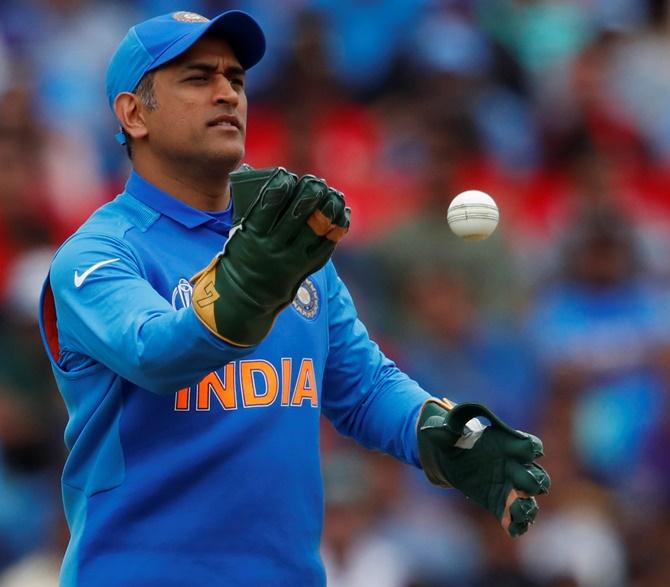
The occasional bulging of the eyes, the annoyingly incessant fastening and unfastening of the gloves, the odd tilt of the head behind the stumps, the look up to the heavens, the thumb reaching out for the periphery of the left eye, the flapping of the shoulders in one sudden circular motion.
Mahendra Singh Dhoni has the mannerisms of a man about to be hauled up and put in a dental chair for an entire week. And then, there's the face.
Inscrutable. Serene. Godlike.
The body screams nervous surrender, the visage looks ready for war -- a strange dichotomy that is a Dhoni hallmark.
At Old Trafford on a lugubrious Mancunian afternoon, where the rain hung in the air much like Mitchell Santner's loopy left-arm spin, Dhoni's face, for the first time since that cretinous run-out on debut against Bangladesh, displayed something else.
It might have taken 14 years, 6 months and 17 days, but there was something. As he walked back after a Martin Guptill run-out for the ages, the face contorted with crippling disappointment. A tear perhaps.
The greatest poker player the world has never known finally submitting to emotion. The crowd gasped in agony.
Michael Jordan believed that the last shot, with the buzzer lurking, was his destiny -- stuff he was born for.
Dhoni, in a similar vein, was brought to earth to stroke the winning run -- the oasis of calm amid a vortex of chaos, the Zen monk at an EDM concert.
Dhoni and the finish line: The most endearing love affair of our times.
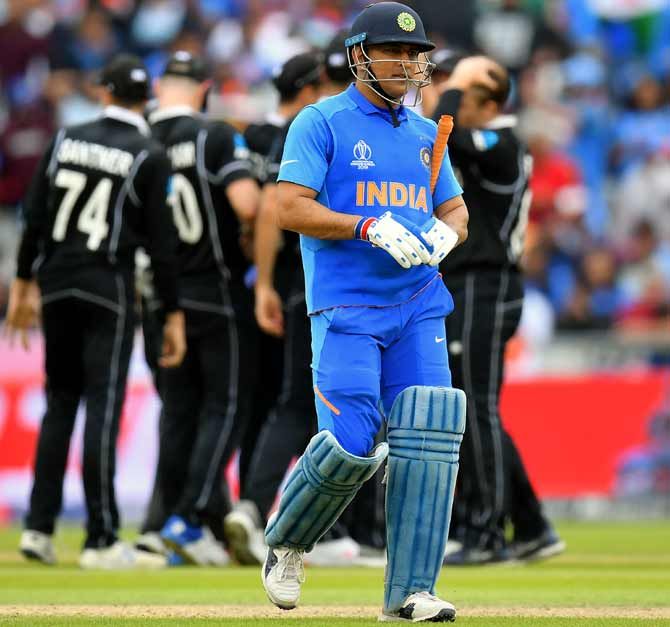
The thing about Dhoni is that he has made believers out of all of us.
Such is the certitude that no target ever seems unattainable. And in typical Dhoni fashion against New Zealand, he had us believing again.
When India's top-order was obliterated by the Kiwi pace attack, it seemed that the stars had aligned for the ageing warrior; that rare opportunity to steer his team home from the most improbable of positions, perhaps one last chance to silence the brickbats once and for all.
When the end eventually came, it was cruel and unlucky, in circumstances that could have featured in a Greek tragedy.
But he was there, blocking and nudging, desperately swimming against the tide before drowning in one moment of minor misjudgment.
Before the nudger, of course, was the dasher: The long-haired alter ego from more than a decade ago who pretty much reset the standards for wicket-keeper batsmen in India.
Dhoni ensured that they were no longer required to just keep wickets, but also bat with the carefree abandon that he came to signify.
Ask Pakistan about Vizag 2005, or Sri Lanka about Jaipur six months later. The aesthetic wasn't always the most appealing, but the functionality was brutally efficient.
It's only reasonable to suggest that without a Dhoni, Rishabh Pant would have never picked up the gloves, or bat the way he does.
There are millions of others, in small towns and big cities, who continue to model themselves on him, hoping to imbibe his ethos and charisma.
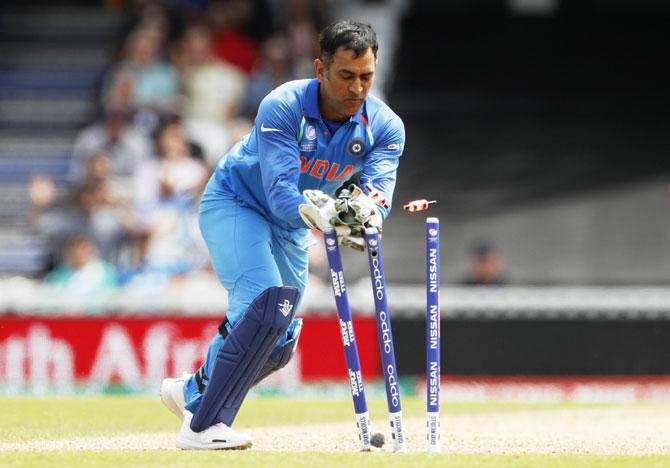
The Dhoni cult is, in fact, an interesting phenomenon. Till some years ago, he was revered deeply but celebrated only occasionally.
His status was that of a humble leader and not of a superhero out to save humanity.
Now, of course, he is adored akin to a demigod; every success is praised to the skies, every failure defended with staunch devotion.
Crowds fill up entire stadiums just to watch him practise and they cheer at a dismissal because they know he's the next man in. Social media has perhaps amplified this greatly, but Dhoni may just be the most popular athlete this country's ever known.
The story goes that, once, in 2008, when Dhoni returned to Ranchi to visit the store of Chhotu bhaiyya -- a long-time friend who also features in his biopic -- thousands lined the streets to catch a glimpse of him.
Chhotu bhaiyya had to eventually hide him in a three foot high loft.
It was around the same time that Dhoni, then just having been made the skipper in all three formats, made the transition from dasher to consolidator.
The risky shots were substantially curbed, as he began to nurdle the ball with the precision of a world-class surgeon running a scalpel through his patient's chest.
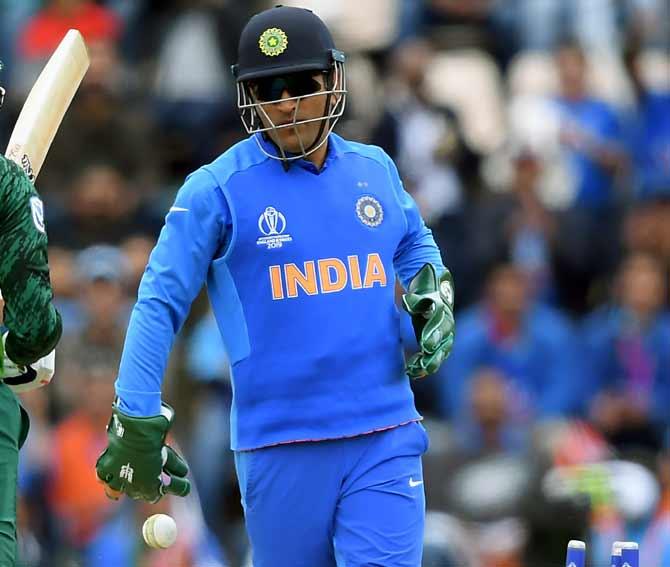
The ability to hit the ball remained intact, but was only showcased when the team truly needed it.
In the process, he became the master finisher, closing out games with rock-like nonchalance.
Virat Kohli may have transformed the art of chasing in recent years, but he has only bettered the traits that Dhoni first introduced: Understanding the state of the game, reading the opposition, knowing when to pull the trigger; all of which was supplemented by raw, unmatched cricketing talent.
Even in that last match against New Zealand -- despite the naysayers lamenting that he left it too late -- Dhoni played it smart.
With Jimmy Neesham -- by no means a frontline bowler -- poised to bowl the last over, Dhoni, as always, backed himself to get there.
The sad thing is that we'll never know if he could have actually made it.
Johannesburg, Brisbane, Mumbai, Birmingham. Dhoni has many successes to his credit -- becoming the No 1 ODI batsman in the world, making India the top ODI and Test team, among others -- but he will forever be synonymous with four of India's finest limited-overs triumphs.

In the final of the 2007 World T20 in Johannesburg, he led with the assurance of a man born to be captain, trusting the rookie Joginder Sharma with the last over when common sense might have told him to go with Harbhajan Singh, a veteran with more than 10 years of international experience.
As a result, India beat Pakistan in the most thrilling circumstances.
A few months later at the Gabba, the frenzied celebrations of the Bullring made way for a stoical calm that helped India over the line in a tense triangular series final over Australia.
Early in his reign, Dhoni had come in for some criticism for asking the selectors to drop the likes of Sourav Ganguly and V V S Laxman.
When India became the first team to win a tri-series Down Under by playing a bunch of youngsters, Dhoni's decision was fully vindicated.
Irfan Pathan, who bowled the last over in that game, later said it was only the captain's belief that had given them the fortitude to pull through.
If it was Dhoni's captaincy in Brisbane, it was his batting that turned the game in the World Cup final of 2011.
He promoted himself -- woefully out of touch at the time -- ahead of the in-form Yuvraj Singh, and batted with sublime poise, ending up unbeaten at 91.
At Edgbaston, the tactician in him stood up again when it mattered, using Ravichandran Ashwin masterfully on a pitch that was damp and evidently unfavourable for any variety of spin.
India comfortably defeated England in the final of the 2013 Champions Trophy.
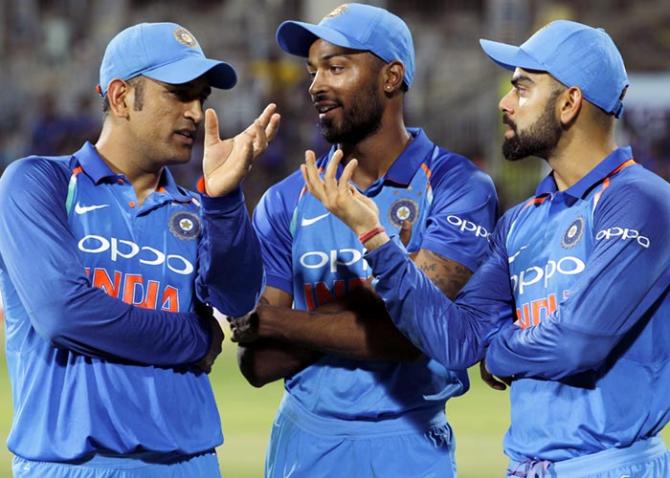
Dhoni the batsman -- with over 10,000 runs at an average of 50 -- will undoubtedly go down as one of the greats, but Dhoni the captain was the real deal.
He saw things we mortals couldn't. He could take a struggling middle-order batsman -- Rohit Sharma -- and turn him into the most feared white-ball player in the world by asking him to open.
He could take a 'bits and pieces' player -- Ravindra Jadeja -- and make him the No 1 Test bowler in the world.
He could summon a bowler out of nowhere -- think Suresh Raina or Kedar Jadhav -- and he'd get him a wicket.
He could set an unconventional field -- Kieron Pollard and straight mid-off -- and the batsman would oblige.
If Ganguly ushered in a new style of leadership by being fearless, Dhoni tempered that with intelligence, foresight and trust -- a utopian skill set that made him such an irresistible force.
Even as he's no longer captain, the players still listen to him, often trusting him blindly.
In the World Cup pool game against the West Indies, with India close to wrapping up a win, he asked Kuldeep Yadav to bowl a googly on the last ball of an over.
'Bahar waala (the one that leaves the bat),' he shouted from behind the stumps.
Yadav responded without questioning, landing a spitting wrong one that beat the right-hander's bat.
The following over, Dhoni demanded a slow leg-spinner from Yuzvendra Chahal; the leggie paid his former skipper the ultimate deference by delivering a near-perfect leg-break.
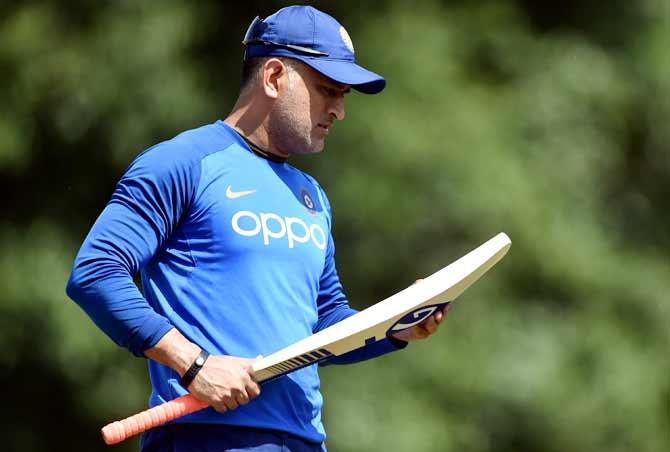
It's safe to say that, as Dhoni's cult has grown, the criticism has also intensified.
Some say that retirement should have come a few years ago, others reckon that he's 'too slow' to be playing limited overs cricket.
Such arguments have definite merit, but Dhoni's stuck on, unfazed and reclusive as ever, quietly going about his work.
The wicket-keeping -- despite a slightly disappointing World Cup -- remains in solid shape, and the batting, although no longer as effective, still comes good in certain situations.
Which is perhaps a good time to ask: How much more can he offer? He has, after all, given us countless memories, and by now, the mind must be exhausted, the back aching and the hands sore.
Now wouldn't be such a bad time to sit back and just watch what the others have picked up from him over the years.
Dhoni may have sworn by the motto of 'never leave it to the next man and finish it yourself' all his cricketing life, but it seems sensible to finally let go.
Irrespective of what he chooses to do, his legacy will be a marvellous one. (With him greying just about enough around the temples and the sides to exude an air of wisdom and influence, Dhoni could, like so many of his former teammates, venture into broadcasting.)
Dhoni may not be the greatest Indian player ever, but he will forever be the most important, one who not only altered the landscape of Indian cricket but also single-handedly carried it for more than a decade, unearthing new players and grooming existing talent.
He will also be the most contradictory: A man we see every day but don't know, a man who is sometimes loved and loathed in equal measure, a man we're seemingly tired of seeing yet can't imagine life without.



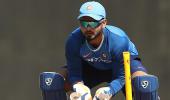










 © 2025
© 2025